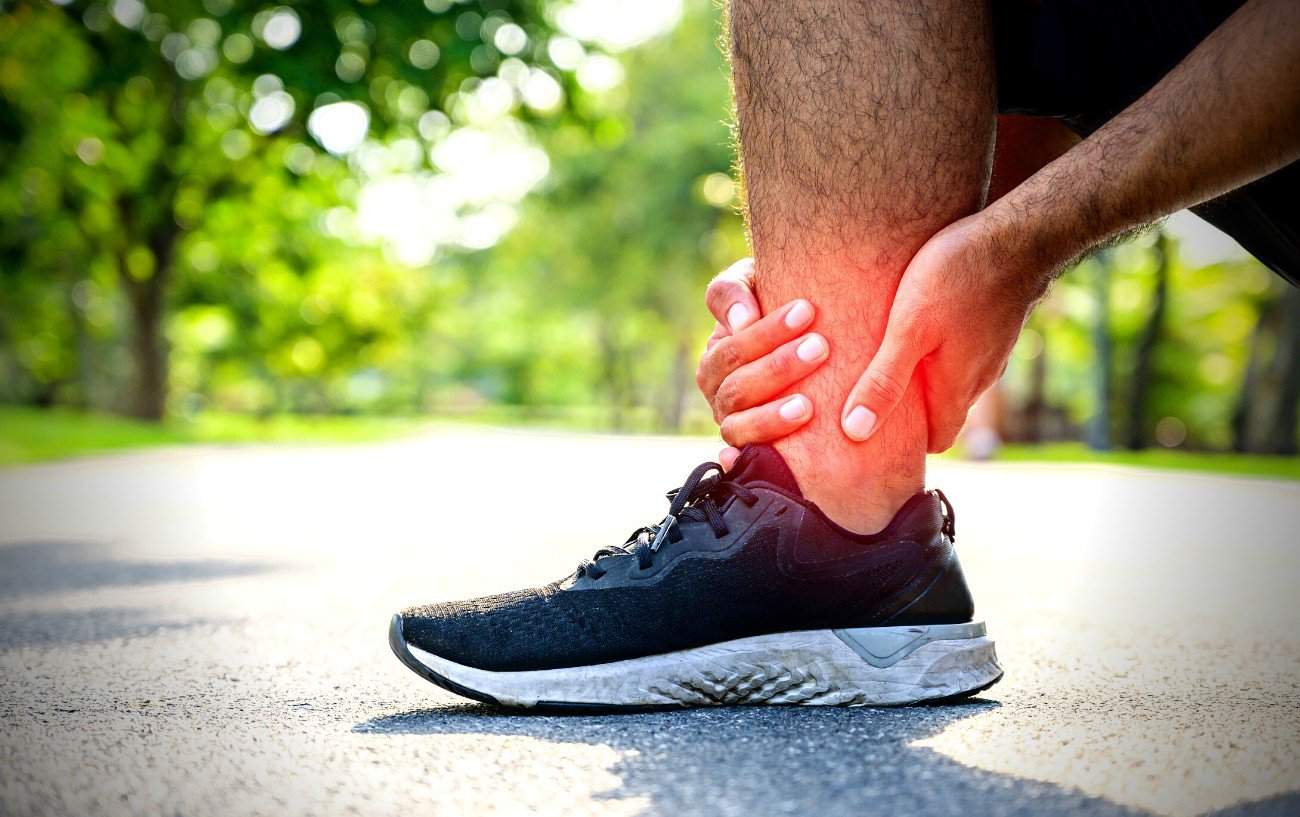Running can be a somewhat divisive sport, with people either loving or hating it.
Non-runners often scratch their heads at the sight of runners voluntarily trotting down the road at dawn with just the bouncing beam of a headlamp to illuminate the path through the darkness.
At the same time, that very runner questions why anyone would want to start their day any other way than logging miles on the open road.
Most people sense that running is good for you, and they are right. Studies upon studies have demonstrated various physical and mental health benefits of aerobic exercise, if not running specifically.
However, there are some potential downsides or risks associated with running, and they often seem to be conveniently available on the tip of every non-runner’s tongue.
So, where does the verdict land? Is running good for you? Keep reading as we give you all of the excellent health benefits of running so you can begin to improve your quality of life today.

Is Running Good For You?
If you’re wondering if you want to take up running, you might think about your runner friends who’ve complained of various injuries from time to time or consider the claims you might have heard, such as “running is bad for your knees.”
Though there are some potential risks associated with running for some people, most experts would agree that overall, yes, running is good for you.
14 Reasons Running Is Good For You
The list of evidence-backed reasons running is good for you is extensive, spanning the gamut from improving heart health to reducing stress. Here are some of the benefits of running and the key ways in which running can improve your life and well-being:
#1: Running Increases Longevity
We all want to live long and full lives, and running may be one means of helping achieve this goal. Research1Pedisic, Z., Shrestha, N., Kovalchik, S., Stamatakis, E., Liangruenrom, N., Grgic, J., Titze, S., Biddle, S. J., Bauman, A. E., & Oja, P. (2019). Is running associated with a lower risk of all-cause, cardiovascular and cancer mortality, and is the more the better? A systematic review and meta-analysis. British Journal of Sports Medicine, 54(15), bjsports-2018-100493. https://doi.org/10.1136/bjsports-2018-100493 has found that runners have about a 25-30% lower risk of all-cause mortality, and consistent running has been found2Lee, D.-C., Brellenthin, A. G., Thompson, P. D., Sui, X., Lee, I-Min., & Lavie, C. J. (2017). Running as a Key Lifestyle Medicine for Longevity. Progress in Cardiovascular Diseases, 60(1), 45–55. https://doi.org/10.1016/j.pcad.2017.03.005 to increase lifespan by about three years.

#2: Running Improves Cardiovascular Fitness And Health
If you’ve ever run to catch a subway, child, or dog and felt breathless immediately afterward, it probably comes as no surprise that running works your cardiovascular system.
Your heart rate increases as you run to pump more blood (and thus oxygen and nutrients) to your working muscles.
Over time, consistent running adapts your heart and lungs. Your heart becomes stronger, enabling it to pump a greater volume of blood per beat, and your lungs become more powerful and capable of taking in more air per breath.
As your cardio efficiency improves, you can run faster with less effort. Perhaps more importantly, your heart, lungs, and blood vessels become stronger and healthier, helping fight against the risk of cardiovascular disease (heart disease).
#3: Running Increases Muscular Strength
Running is a total-body workout that strengthens your legs, core, and upper body.
As long as you are fueling your body with enough calories and protein to support your training, running can help build muscle and increase strength.
In addition, running can increase muscle definition and physique when coupled with fat loss. (Even better if you can add some strength training sessions into your weekly routine).

#4: Running Can Reduce the Risk of Arthritis
One of the most common concerns about long-term running is that it can damage joints and increase the risk of arthritis.
However, the research has been inconclusive, and some studies suggest that habitual running may actually decrease the risk of arthritis and promote joint health.
For example, some studies3Ponzio, D. Y., Syed, U. A. M., Purcell, K., Cooper, A. M., Maltenfort, M., Shaner, J., & Chen, A. F. (2018). Low Prevalence of Hip and Knee Arthritis in Active Marathon Runners. Journal of Bone and Joint Surgery, 100(2), 131–137. https://doi.org/10.2106/jbjs.16.01071 have found that marathoners and long-distance runners may have healthier knees than sedentary age-matched peers, while others have found4Mitchell, U. H., Bowden, J. A., Larson, R. E., Belavy, D. L., & Owen, P. J. (2020). Long-term running in middle-aged men and intervertebral disc health, a cross-sectional pilot study. PLOS ONE, 15(2), e0229457. https://doi.org/10.1371/journal.pone.0229457 that running can improve the health of the spine.
#5: Running Increases Bone Density
Strong bones are more resilient and less likely to fracture, which is especially important as you age and bone mineral density decreases.
Numerous studies have demonstrated that the impact stresses from high-impact activities like running (as opposed to low-impact activities such as swimming) stimulate the bones to lay down more minerals within the bony matrix to strengthen the structure.
The bones also strengthen and adapt to running by increasing the production of bone-building hormones in the body. This stimulates the body to make more bone cells and inhibits the activity of cells that break down bone cells.
#6: Running Can Lower Your Blood Pressure
Hypertension, or high blood pressure, is an epidemic. For example, according to the Centers of Disease Control and Prevention 5(CDC),Centers for Disease Control and Prevention. (2023, May 12). Hypertension Prevalence in the U.S. | Million Hearts®. Centers for Disease Control and Prevention. https://millionhearts.hhs.gov/data-reports/hypertension-prevalence.html nearly half (47%) of all adults in the United States have hypertension or are taking medication to control blood pressure.
The good news is that running can lower your blood pressure. In fact, some studies6Naci, H., Salcher-Konrad, M., Dias, S., Blum, M. R., Sahoo, S. A., Nunan, D., & Ioannidis, J. P. A. (2018). How does exercise treatment compare with antihypertensive medications? A network meta-analysis of 391 randomised controlled trials assessing exercise and medication effects on systolic blood pressure. British Journal of Sports Medicine, 53(14), 859–869. https://doi.org/10.1136/bjsports-2018-099921 have found that running as a form of exercise can be just as effective—if not more so—than common anti-hypertensive medications.

#7: Running Reduces Stress
Many of us deal with chronic or acute stress and anxiety, whether due to work, finances, illness, relationships, change, world or national news, safety, or any number of other challenges.
Getting outside and pounding the pavement or trail is a great way to reduce stress and anxiety. Running can lower cortisol levels, a stress hormone, helping you feel more relaxed.
According to research,7Arida, R. M., & Teixeira-Machado, L. (2021). The Contribution of Physical Exercise to Brain Resilience. App.dimensions.ai, 14. https://doi.org/10.3389/fnbeh.2020.626769 running may also help you deal with future stressful events and be more resilient to life’s stressors.
#8: Running Burns Calories
Running is a metabolically demanding exercise and burns a lot of calories as opposed to brisk walking or other less-intense cross training.
In fact, running is one of the most efficient types of exercise in terms of the number of calories burned per minute, so if fat loss or weight loss is your goal, running can create the calorie deficit you need to burn fat.
Of course, overall weight loss highly depends on your diet and caloric intake, but running can be a path towards achieving an ideal body weight.

#9: Running Improves Your Mood
We might all chase what can feel like an elusive “runner’s high”, but this feel-good feeling after finishing a long run or hard workout isn’t all in your head.
Running, and endurance exercise, can activate the body’s natural endocannabinoid system, which can reduce pain and elevate your mood.
If you suffer from depression, running can alleviate symptoms8Kvam, S., Kleppe, C. L., Nordhus, I. H., & Hovland, A. (2016). Exercise as a treatment for depression: A meta-analysis. Journal of Affective Disorders, 202(202), 67–86. https://doi.org/10.1016/j.jad.2016.03.063 and elevate your mood.
#10: Running Boosts Confidence
One of the best things about running is that it builds self-efficacy and confidence. You can set and achieve goals and conquer things you never thought possible.
Finishing a good run can leave you feeling proud, capable, powerful, and even elated, ready to conquer anything that comes your way with a positive attitude.
Running can also be a great way to meet others if you join a local running club or participate in local races or parkruns.

#11: Running Can Help You Sleep Better
Many people struggle to fall and stay asleep at night, but consistent running may improve quality of sleep and reduce the symptoms of insomnia.
For example, research has found9Kalak, N., Gerber, M., Kirov, R., Mikoteit, T., Yordanova, J., Pühse, U., Holsboer-Trachsler, E., & Brand, S. (2012). Daily Morning Running for 3 Weeks Improved Sleep and Psychological Functioning in Healthy Adolescents Compared With Controls. Journal of Adolescent Health, 51(6), 615–622. https://doi.org/10.1016/j.jadohealth.2012.02.020 that running for 30 minutes in the morning can promote better sleep at night.
#12: Running Can Reduce the Risk of Certain Cancers
The health benefits of running have been shown to help reduce the risk of 26 different cancers, independent of other risk factors, according to research.10Moore, S. C., Lee, I-Min., Weiderpass, E., Campbell, P. T., Sampson, J. N., Kitahara, C. M., Keadle, S. K., Arem, H., Berrington de Gonzalez, A., Hartge, P., Adami, H.-O., Blair, C. K., Borch, K. B., Boyd, E., Check, D. P., Fournier, A., Freedman, N. D., Gunter, M., Johannson, M., & Khaw, K.-T. (2016). Association of Leisure-Time Physical Activity With Risk of 26 Types of Cancer in 1.44 Million Adults. JAMA Internal Medicine, 176(6), 816–825. https://doi.org/10.1001/jamainternmed.2016.1548
Furthermore, evidence suggests11Validate User. (n.d.). Academic.oup.com. https://academic.oup.com/epirev/article/39/1/71/3760392 that runners who do find themselves fighting cancer have higher survival rates and manage treatments better than non-exercising peers.
#13: Running Can Attenuate Age-Related Cognitive Decline
Evidence suggests12Guiney, H., & Machado, L. (2012). Benefits of regular aerobic exercise for executive functioning in healthy populations. Psychonomic Bulletin & Review, 20(1), 73–86. https://doi.org/10.3758/s13423-012-0345-4 that aerobic exercise such as running can improve cognitive function and mental focus, and slow the progression of age-related cognitive decline.

#14: Running Can Improve Insulin Sensitivity
If you suffer from type two diabetes, pre-diabetes, or insulin resistance, running regularly may help reverse or manage your condition.
Running has been shown13Lin, X., Zhang, X., Guo, J., Roberts, C. K., McKenzie, S., Wu, W., Liu, S., & Song, Y. (2015). Effects of Exercise Training on Cardiorespiratory Fitness and Biomarkers of Cardiometabolic Health: A Systematic Review and Meta‐Analysis of Randomized Controlled Trials. Journal of the American Heart Association, 4(7). https://doi.org/10.1161/jaha.115.002014 to improve insulin sensitivity, potentially because it reduces body fat and oxidizes blood glucose and stored glycogen.
Moreover, running can reduce the risk of developing type 2 diabetes14Wang, Y., Lee, D., Brellenthin, A. G., Eijsvogels, T. M. H., Sui, X., Church, T. S., Lavie, C. J., & Blair, S. N. (2019). Leisure-Time Running Reduces the Risk of Incident Type 2 Diabetes. The American Journal of Medicine, 132(10), 1225–1232. https://doi.org/10.1016/j.amjmed.2019.04.035 by up to 72%.
So, is running good for you? What do you think so far?
5 Reasons Running Is “Bad” For You
In much the same way that many people ask the question, “Is running good for you?” plenty of people ask, “Is running bad for you?”
The reasons running is good for you typically outweigh the reasons running can be bad for you both in terms of number and significance, but any fair argument should present both sides.
It’s worth noting that moderation can be key: some of the reasons running is good for you can become reasons running is bad for you if you run too much or don’t give your body adequate rest days.

#1: Running Can Cause Musculoskeletal Injuries
Running is a high-impact activity that places much stress and strain on muscles, tendons, ligaments, cartilage, and bones.
Overuse injuries, such as stress fractures and tendinitis, are particularly common, especially amongst high mileage runners, runners who fail to consume an adequate number of calories to support their training, and runners who increase their training volume or intensity too quickly.
For example, studies show15Nielsen, R. Ø., Parner, E. T., Nohr, E. A., Sørensen, H., Lind, M., & Rasmussen, S. (2014). Excessive Progression in Weekly Running Distance and Risk of Running-Related Injuries: An Association Which Varies According to Type of Injury. Journal of Orthopaedic & Sports Physical Therapy, 44(10), 739–747. https://doi.org/10.2519/jospt.2014.5164 that the risk of running-related injuries increases significantly when runners increase their training volume or intensity more than 10% per week.
Following a running program designed by a certified coach can help you increase volume and intensity gradually, lower the risk of injury, and reap the benefits of running.
#2: Running Can Suppress Your Immune System
Although moderate running can boost your immune system, excessive exercise or high-volume training can depress it and increase your risk of illnesses.
#3: Running Can Increase Your Risk of Urinary Incontinence
There is some evidence to suggest16Goldstick, O., & Constantini, N. (2013). Urinary incontinence in physically active women and female athletes. British Journal of Sports Medicine, 48(4), 296–298. https://doi.org/10.1136/bjsports-2012-091880 that high-impact exercise such as running can increase the risk of urinary incontinence, particularly among women.
Running may weaken your pelvic floor muscles, making it more difficult to maintain control of the sphincters that ensure you retain urine without leakage.

#4: Running May Reduce Your Sex Drive
Running may alter your hormonal profile when done at high intensities (sprints and other high-intensity workouts), especially on a chronic basis.
For example, running can lower testosterone17HACKNEY, A. C., LANE, A. R., REGISTER-MIHALIK, J., & OʼLEARY, C. B. (2017). Endurance Exercise Training and Male Sexual Libido. Medicine & Science in Sports & Exercise, 49(7), 1383–1388. https://doi.org/10.1249/mss.0000000000001235 in men, which can reduce libido and sexual performance, and excessive running can also increase cortisol, which can lead to weight gain and trouble sleeping.
#5: Running May Increase the Risk Of Osteoarthritis
The research seems too equivocal to make a definitive call either way here, but there is some evidence to suggest18Driban, J. B., Hootman, J. M., Sitler, M. R., Harris, K. P., & Cattano, N. M. (2017). Is Participation in Certain Sports Associated With Knee Osteoarthritis? A Systematic Review. Journal of Athletic Training, 52(6), 497–506. https://doi.org/10.4085/1062-6050-50.2.08 that long-distance running may increase the risk of osteoarthritis, particularly in the knees and hips.
When weighing the pros and cons of running, we are convinced the benefits outweigh the risks, especially considering that these risks can be mostly mitigated with a sensible approach to training.
Which side of the argument are you on?
If we have convinced you to start your running career and increase your fitness level, let us help you with our How To Become A Runner Guide.













